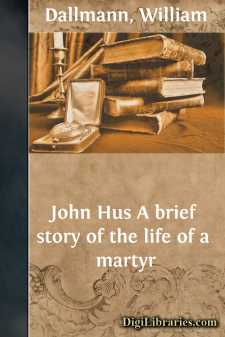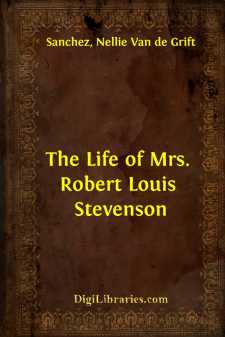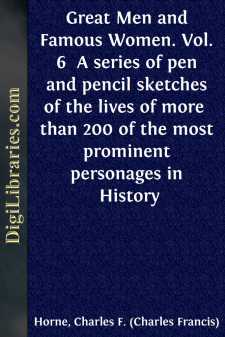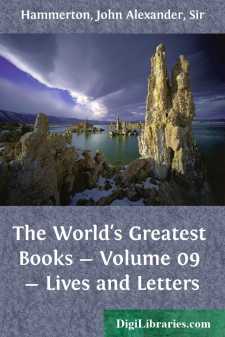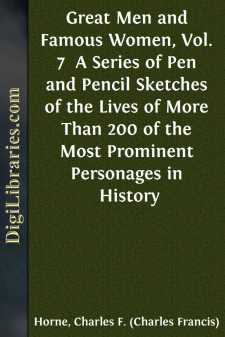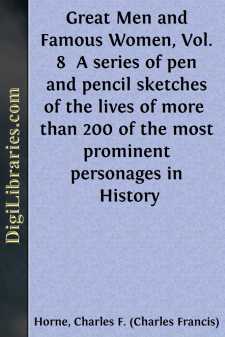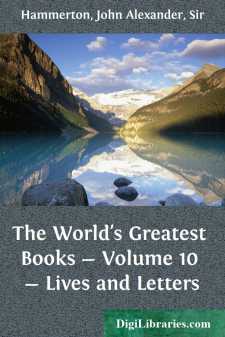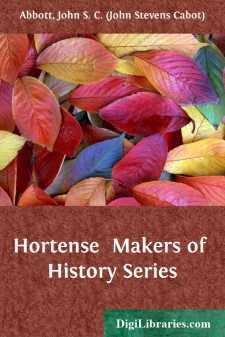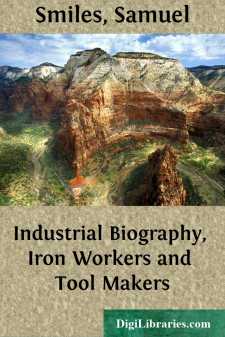Biography & Autobiography
- Adventurers & Explorers 15
- Artists, Architects, Photographers 16
- Business 2
- Composers & Musicians 14
- Criminals & Outlaws 5
- Editors, Journalists, Publishers 6
- Educators 1
- Entertainment & Performing Arts 3
- General 73
- Health, Exercise & Fitness 1
- Historians 3
- Historical 83
- Law Enforcement 1
- Lawyers & Judges 3
- Literary 147
- Medical 7
- Military 48
- Naturalists, Gardeners, Environmentalists 8
- Personal Memoirs & Diaries 226
- Philosophers 3
- Political 9
- Presidents & Heads of State 38
- Religious 38
- Rich & Famous 27
- Scientists 13
- Women 31
Biography & Autobiography Books
Sort by:
by:
William Dallmann
The Youth of Hus. In a humble hamlet in the southern section of beautiful Bohemia near the Bavarian border of poor peasant parents was born a boy and called Jan—Hus was added from Husinec, his birthplace; some say he saw the light of day on July 6, 1373, but that is not certain. When about sixteen Hus went to the University of Prag, the first one founded in the German empire by Charles IV in 1348....
more...
ANCESTORS To arrive at a full understanding of the complex and unusual character of Fanny Van de Grift Stevenson, which perhaps played as large a part as her beauty and intellectual charm in drawing to her the affections of one of the greatest romance writers of our day, one must go back and seek out all the uncommon influences that combined to produce it—a long line of sturdy ancestors, running back...
more...
Some of Arnold's biographers have declared that he was a very vicious boy, and have chiefly illustrated this fact by painting him as a ruthless robber of birds'-nests. But a great many boys who began life by robbing birds'-nests have ended it much more creditably. The astonishing and interesting element in Benedict Arnold's career was what one might term the anomaly and incongruity...
more...
I.--Héloïse to Abélard Heloise has just seen a "consolatory" letter of Abelard's to a friend. She had no right to open it, but in justification of the liberty she took, she flatters herself that she may claim a privilege over everything which comes from that hand. "But how dear did my curiosity cost me! What disturbance did it occasion, and how surprised I was to find the whole...
more...
The poems of Homer differ from all other known poetry in this, that they constitute in themselves an encyclopædia of life and knowledge at a time when knowledge, indeed, such as lies beyond the bounds of actual experience, was extremely limited, but when life was singularly fresh, vivid, and expansive. The only poems of Homer we possess are the "Iliad" and the "Odyssey," for the...
more...
Phidias, one of the greatest sculptors the world has seen, and whose name has become, as it were, the synonym of his art, was born at Athens about 500 B.C. He belonged to a family of artists, none of whom indeed were distinguished in their profession, but their varied occupations furnished the atmosphere in which such a talent as that of Phidias could best be fostered and brought to maturity. His...
more...
I.--Right and Law All human eloquence, among all peoples and in all times, may be summed up as the quarrel of Right against Law. But this quarrel tends ever to decrease, and therein lies the whole of progress. On the day when it has disappeared, civilisation will have attained its highest point; that which ought to be will have become one with that which is; there will be an end of catastrophes, and...
more...
Chapter I. 1776-1794Josephine's voyage to France.In the year 1776 a very beautiful young lady, by the name of Josephine Rose Tascher, was crossing the Atlantic Ocean from the island of Martinique to France. She was but fifteen years of age; and, having been left an orphan in infancy, had been tenderly reared by an uncle and aunt, who were wealthy, being proprietors of one of the finest plantations...
more...
by:
Samuel Smiles
CHAPTER I. IRON AND CIVILIZATION. "Iron is not only the soul of every other manufacture, but the main spring perhaps of civilized society."—FRANCIS HORNER. "Were the use of iron lost among us, we should in a few ages be unavoidably reduced to the wants and ignorance of the ancient savage Americans; so that he who first made known the use of that contemptible mineral may be truly styled...
more...
No golden eagle, warm from the stamping press of the mint, is more sharply impressed with its image and superscription than was the formative period of our government by the genius and personality of Thomas Jefferson. Standing on the threshold of the nineteenth century, no one who attempted to peer down the shadowy vista, saw more clearly than he the possibilities, the perils, the pitfalls and the...
more...


